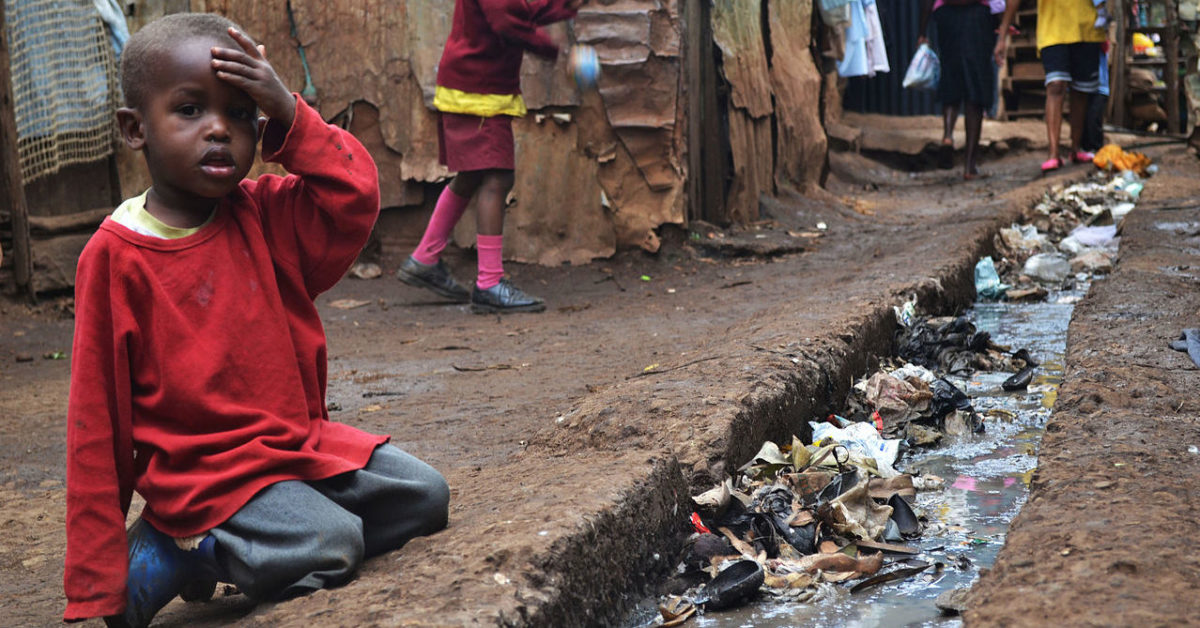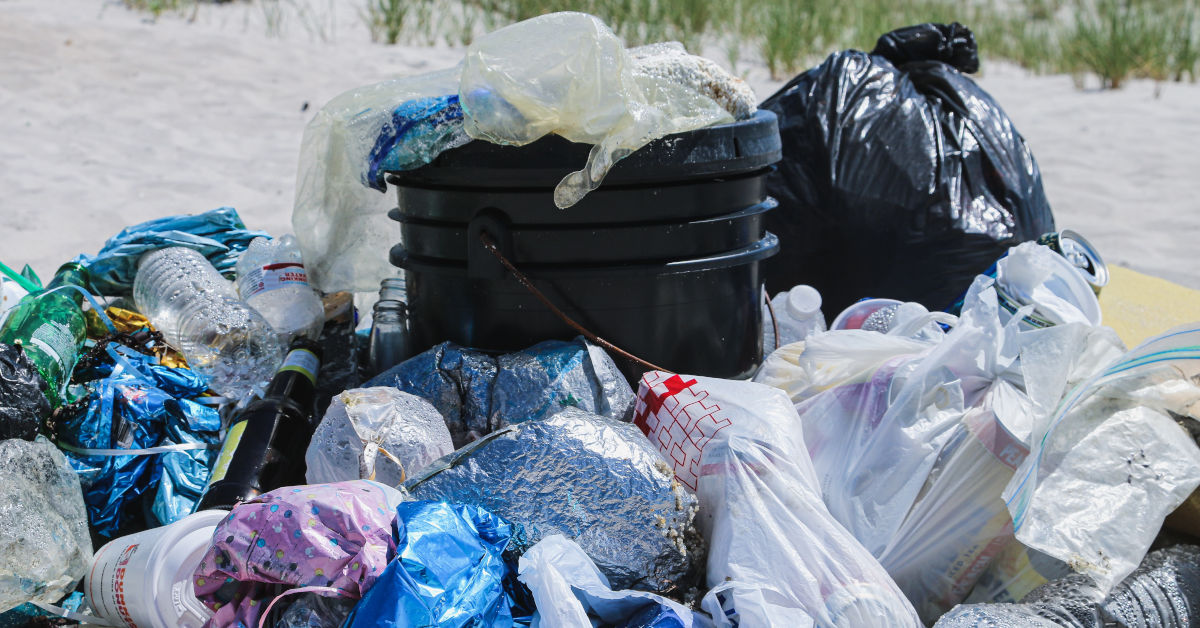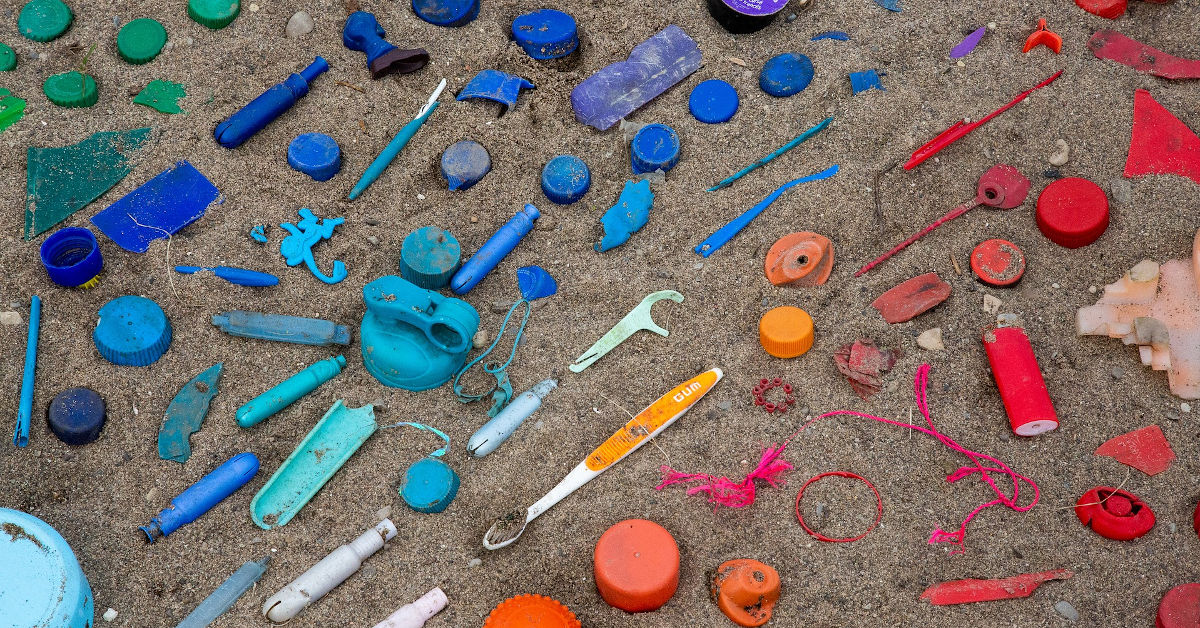Plastic pollution is one of the greatest challenges of our time. With society’s increasing demand for single-use plastics and its throw away culture, we have created this incredibly hard-wearing and versatile material that is now widely utilised around the world. The United Nations Environment Programme (UNEP) estimates that more than 8.3 billion tonnes of plastic have been produced globally since the 1950s, with around 60% ending up in landfills or in the environment [1]. However, plastics are not biodegradable which means they don’t naturally break down over time and therefore follow a mostly linear lifecycle from creation to “disposal”. Disposal itself is a misleading term as only 12% of plastics are incinerated, meaning most of the plastic goods ever created are still around [2]. It is estimated that during the pandemic, single-use plastic use has increased by 250 to 300 percent, which will create lasting and permanent environmental effects [3].This accumulation of plastics in the environment has many devastating impacts on the surrounding wildlife, food chains and consequently human health.
Plastic pollution in Kenya
While environmental awareness and outrage in wealthier nations has restricted the use of plastics in products and packaging, many developing countries, such as Kenya, are still growing their plastic industry and often shoulder the burden of the western world’s waste through the latter’s exports of plastic [4]. Without the infrastructure to manage the waste or the funds to export it elsewhere, plastic pollution has drowned these nations, blocking roads, clogging waterways, damaging fields and becoming intricately mixed into animal feeds. Despite Kenya having stringent laws in place to prevent plastic pollution, it still suffers with this non-biodegradable form of waste right across the country. Producing, selling or using plastic bags is now illegal in Kenya and can lead to four years in jail or a $40,000 fine [5]. Before this ban came into effect in 2017, the country was producing around 4000 tons of plastic monthly with 100 million bags being offered by supermarkets alone [6]. This had devastating implications for the local wildlife, causing around three out of ten animals in abattoirs in Kenya to be found with plastic in their stomachs [7]. In addition, the accumulation of plastic bags in areas of severe littering and dumping such as Kibera, a Kenyan slum, was known to create several million micro-habitats for the breeding of mosquitoes, therefore effectively increasing the spread of malaria. This caused a huge demand for urgent action to be taken.

The Word Forest Organisation’s response
The Word Forest Organisation’s CEO, Tracey West, comments, “The topic of plastic pollution might not seem like an obvious connection to our reforestation work, but believe me, it is. I’ve seen way too many pits dug on peoples’ shambas (homesteads) which they fill with plastic rubbish and food waste. In the bush, there is no fortnightly rubbish collection, community recycling bins or municipal tips. As the prevalence of plastic increases, so do the pits and we’ve got a long way to go facilitating education about the damage to the environment and to human health and well being too.
I know we’ve got a long way to go. We need to do all we can to encourage better behaviours for dealing with it and not embracing it in the first instance.
The Word Forest Organisation is making waves to help ease the plastic strain in Kenya. In April 2019, our Mothers of the Forest led a cleanup day in Malindi, a local coastal town. They collected a substantial haul of plastics and other litter from the beaches.”
The total amounts of rubbish collected overall are summarised below:
- 471 kg of plastics
- 196 kg of glass
- 702 kg of polythene
One of the great outcomes from the project was that it inspired a group of men to undertake similar projects in Garashi and Marafa, two very small towns at the heart of our planting project in Boré.
Eva Jefa, who is the leader of the Mothers of the Forest, commented, “The clean up events are very beneficial and could make a huge difference to the local environment. However, their impact is only appreciated for a while, before it goes back to plastic litter everywhere within a few days, if not hours.
Furthermore, due to the current COVID-19 crisis, most of the cleanup activities are on hold as the curfews in Kenya prevent us from running more collection events. However, the educational benefits of the clean up are still being felt across the region and positive change is underway.”
Upcoming projects from The Word Forest Organisation
“We are in the process of developing a recycling initiative to encourage people to collect and recycle plastic waste in Kenya. We are exploring the possibility of paying around 1 Kenyan shilling (0.76 GBP) for each bottle collected which would then be sold on to a recycling company in Nairobi. Two of our Word Forest groups (the Bore Mothers of the Forest and another group from Nairobi) would be involved in implementing the project and we hope that the system will become self-funding.”
Simon West, Chair of Trustees of The Word Forest Organisation.
Eva Jefa states, “I believe if there is a way to turn trash into cash, people will be more responsible with their rubbish, which is a promising response and suggests the community will be keen to get involved in the upcoming plans.”

Public responses/call to action
There is still a vast amount of action which needs to be initiated by European governments to enforce stricter rules on the export of plastics and to tackle plastic pollution in developing countries such as Kenya, but there are also numerous ways we can help as individuals.
How we can help reduce plastic pollution
- Educate yourself: recognise your unsustainable habits by watching environmental documentaries and taking the time to read about the issues with plastic pollution.
- Reduce plastic consumption: before buying another plastic-based product, really ask yourself if you need it or if there is a more sustainable alternative you could invest in instead.
- Limit purchases of single-use plastics: invest in reusable variations of plastics such as fabric bags, metal bottles and straws, and bamboo toothbrushes.
- Attempt to buy products with plastic free packaging: especially when food shopping, try and avoid items which are covered in non-recyclable plastic packaging.
- Recycle! Research what your local council accepts in your recycling and stop throwing it in the rubbish bin!
Support environmental charities such as The Word Forest Organisation, who carry out specific projects in Kenya to directly tackle plastic pollution by arranging clean up events and recycling initiatives to help reduce the dumping of litter across the country.
Anna Williams, Beth Hanson and The Team
References
1. https://www.vanguardngr.com/2020/06/kenya-bans-single-use-plastics-in-fight-against-environmental-pollution
2. https://www.nationalgeographic.com/news/2017/07/plastic-produced-recycling-waste-ocean-trash-debris-environment/
3. https://saultstar.prod.postmedia.digital/news/local-news/study-suggests-single-use-plastics-may-be-on-the-rise-with-covid-19/wcm/eba9f67a-a4e1-4966-ab6d-fd8fc36fd384
4. https://theintercept.com/2020/04/19/africa-plastic-waste-kenya-ethiopia/
5. https://www.theguardian.com/environment/2017/aug/28/kenya-brings-in-worlds-toughest-plastic-bag-ban-four-years-jail-or-40000-fine
6. https://www.mdpi.com/2071-1050/10/5/1664/htm
7. http://www.ipsnews.net/2020/01/not-trade-good-case-plastics-waste/



